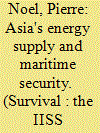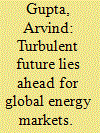| Srl | Item |
| 1 |
ID:
130868


|
|
|
|
|
| Publication |
2014.
|
| Summary/Abstract |
Asia's reliance on international, seaborne energy trade is conducive to strategic cooperation. Whether this will outweigh strategic competition is far from certain. The Asia-Pacific accounts for a large and growing share of the world's energy-demand growth. With imports rising faster than consumption, the region is rapidly becoming the new centre of gravity for global energy markets. Such dynamics have made energy security a key policy concern for Asian states. The naval capacities of these countries are also growing swiftly, prompting some analysts to ask whether an arms race has begun. Although no one would suggest that this build-up of naval power is primarily driven by the need to secure energy supplies, the Chinese and Indian governments have identified energy and resource security as one rationale for developing naval power, particularly blue-water capabilities.
|
|
|
|
|
|
|
|
|
|
|
|
|
|
|
|
| 2 |
ID:
119937


|
|
|
| 3 |
ID:
099641


|
|
|
| 4 |
ID:
132916


|
|
|
|
|
| Publication |
2014.
|
| Summary/Abstract |
President Obama has continued to emphasise the strategic importance of stable energy supplies to US national security interests, with the oil-rich Central Asian region a key part of global energy markets. This region has seen significant economic and strategic inroads by the United States over the last decade in a broad attempt to integrate it within the US-led liberal order. This article examines these policy developments and draws upon theoretical debates on US grand strategy to argue that, rather than necessarily signalling increasing geopolitical rivalry with other powers such as China and Russia, US policy is designed primarily to incorporate the region through deepening market interdependence. As such, while there is a complex mix of geopolitical rivalry and economic interdependence developing in the Caspian, even in the face of purported US decline and increase of its domestic supplies through fracking, Washington remains committed to acting as a hegemonic stabiliser in the Caspian.
|
|
|
|
|
|
|
|
|
|
|
|
|
|
|
|